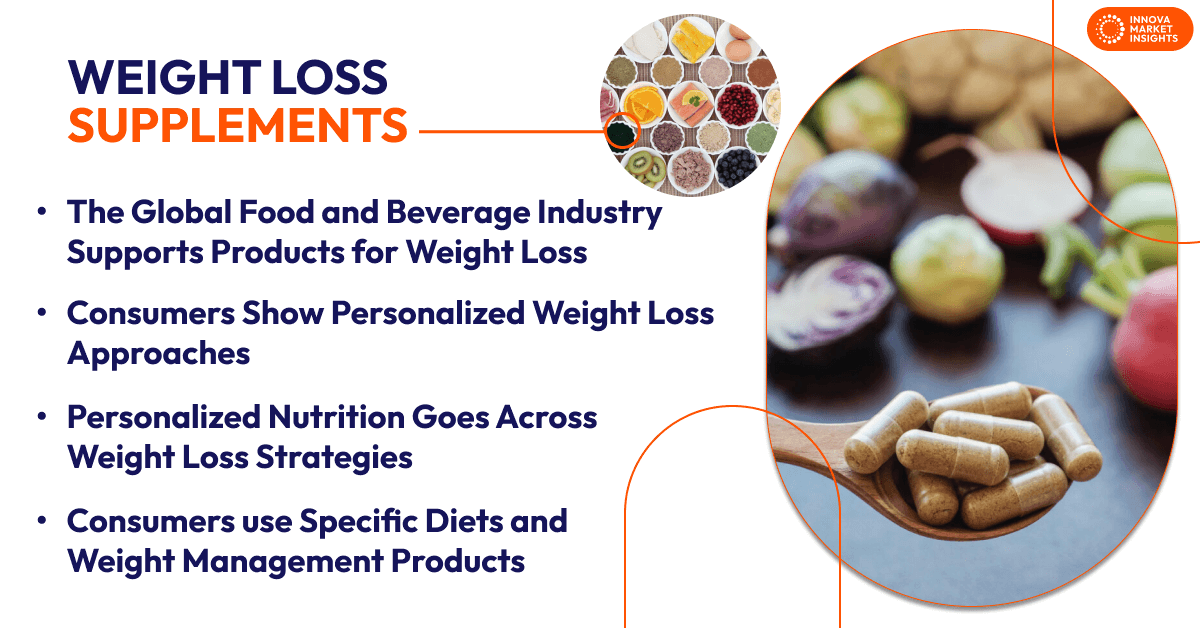Consumers are interested in foods and beverages, such as weight loss supplements, for weight loss and weight management. Our consumer research shows continued interest in low carbohydrate-high protein diets, for example, keto or ketogenic and paleo. Other weight loss diet trends that focus on intermittent fasting, restricting carbs, such as low-carb and sugar-free, are further examples of this type of weight loss lifestyle. Companies remain active in creating and marketing products to meet consumer weight loss needs.
The Global Food and Beverage Industry Supports Products for Weight Loss
Global market trends show that new launches of global weight loss food and beverage products had a compound annual growth rate (CAGR) of +11% over a five-year period between 2018 and 2022. The strongest trends in food and beverages weight loss products are for diet products with keto claims, up +83% CAGR, 2018-2022. India leads other nations in growth trends for weight loss products, with a CAGR of +23% over the same five-year period.
Consumers Show Personalized Weight Loss Approaches
Three in ten consumers surveyed about weight loss say they changed their diet to try to lose weight in the past 12 months. Some weight loss trends regarding weight loss methods include nearly half of consumers saying they use exercise and fitness for weight management, followed by lower calorie, low carbohydrate, or low-fat diets, named by one-third, and a nutritionally balanced weight loss diet, named by one-quarter. For healthy eating for weight loss, consumers limit snacking and exercise portion control. Many consumers avoid “diet” products like weight loss supplements due to artificial ingredients, over-processing, or thinking that diet products do not taste as good as regular products.
Social media has an influence on weight loss dieting. Over one-quarter of consumers surveyed globally say they use digital platforms to improve and find the diet that suits them best.

Weight Loss Products Expand
Branded diet foods sold in supermarkets offer flexibility for general weight control, specific diets, and meal replacement. North America leads other regions in weight loss food and beverage product launches, with 40% of global launches over a recent one-year period. The strongest growth in weight loss products, however, is seen in Asia and Latin America. Weight loss products are expanding beyond traditional cereal bars and meal replacements into baking ingredients, mixes, and plain pasta and noodles. Several claims show strong growth in new product development for weight management, including plant-based, reduced carb, vegan, vegetarian, keto, and high protein. Gluten-free and protein claims dominate weight loss product launches, followed by low/no/reduced carb claims, no added sugar claims, and sugar-free claims.
Ketogenic diet products show dynamic growth. Bakery and cereals account for nearly 3 in 10 keto launches, and the US is the top market. Plant-based weight loss products often feature keto claims.
Personalized Nutrition Goes Across Weight Loss Strategies
Personalized nutrition incorporates several weight loss and weight management strategies, including a better-for-you diet, specific diets and strategies, medically supervised and DIY meal replacement products, weight loss supplements, and supplements with weight loss claims. Consumers who have made changes to their diet reduce sugar and fat most often, followed by salt and sodium, artificial ingredients, and sweeteners. The popularity of keto and other low-carb weight loss diets means consumers no longer fear fat in their diet and instead look for grain- or sugar-free foods.
Consumers Use Specific Diets and Weight Management Products
In 2023, global consumer trends show intermittent fasting was the most popular specific diet, followed by plant-based, gluten-free, lactose-free, and detox. One-quarter of consumers follow the diet of their choice because it’s healthy, while 40% do not follow a specific diet.
Meal replacements are used by 10 percent of consumers globally who are trying to lose weight, and the highest proportion of product launches are in the US. Optifast and Nutrisystem are the leading medically supervised meal replacement programs. DIY meal replacement options for weight management include Slimfast, Layenberger, Optislim, and Exante.
Consumers Take Weight Loss Supplements and Others
About one-third of consumers surveyed take a multivitamin supplement, another one-third take a single vitamin supplement, and about one-fifth take a gut or digestive health supplement. Many dietary supplements claim to help with weight loss. Almost half of supplements with weight loss claims or weight loss supplements make a weight loss claim on the front label. About 40% of supplements with weight management claims also include a digestive or liver claim, and 36% display an energy and stamina claim. A strong majority of supplements with weight loss claims and weight management claims have nutraceutical or functional ingredients, two-thirds have botanical ingredients, and half have minerals and vitamins.
What’s Next in Weight Loss and Weight Management?
For weight loss and weight management, interest in personalized nutrition trends will continue to drive new product development with plant-based, low/no/reduced carb, sugar reduction, keto, and high protein claims. Less common claims such as skin health, prebiotic, mental acuity, and joint or bone health are growing faster than the category overall. In meal replacements, watch for protein and fiber claims, continued growth in vegan, no added sugar, organic claims, and emerging claims in prebiotic and probiotic. Watch for continued digestive health, energy, and stamina in weight loss supplements, with growth in skin health, antioxidants, and mental acuity.
While the US still leads new product development and weight loss trends, weight loss products are expected to grow in other regions.
This article is based on our report, “Global Customized Eating Strategies for Healthy Weight.”
If you are interested in receiving this report, feel free to request a demo through our Contact Form.